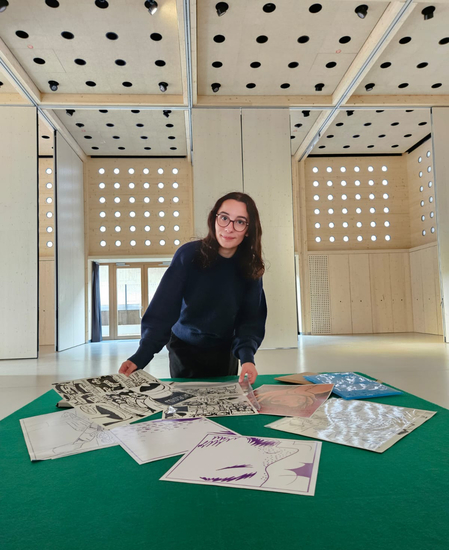Curating is more than creating exhibitions
Defne Kızılöz has been a curatorial intern at the Kunsthochschule Kassel since June 2022. “After two years, my training has prepared me to manage exhibitions both in terms of form and of content,” says Kızılöz.
The word “curate” comes from the Latin verb curare, which means to cultivate or to care for. In a more limited sense, however, curating means publicly exhibiting artistic works. On the classic core tasks of curating, Kızılöz says: “These include conserving a collection, researching individual works, expanding a collection, and creating exhibitions.” On the last point she adds a note of criticism: “I notice how the understanding of curating today has shifted more and more to curators only creating exhibitions. But the spectrum of the curator’s task encompasses much more than that.” By now “curating” has become established in other professional areas such as film and theater festivals, and programmers are now being called curators. Says Kızılöz: “I wouldn’t like to see the word curating being used inflatiously to mean arranging events.”
Curators predominantly work in art spaces, galleries, museums. According to the institution involved, they are responsible for conceiving, organizing, and realizing exhibitions in coordination with the directors. In a museum, for instance, they manage each exhibition across the various departments, they administer the exhibition’s budget, they handle acquisitions of loan items and the fundraising related to the project. In addition, in the case of special exhibitions, curators are responsible for conceiving and producing exhibition publications and for the conceptual development of events programs in collaboration with areas of education and mediating. The scope of these tasks is dependent on the financial and human resources of an institution. Particularly in smaller venues several functions are often combined into a single post.
The curatorial internship at the Kunsthochschule Kassel is located at the intersection of the rector’s office, the press department, and the exhibitors in the Exhibition Area. Kızılöz summarizes the tasks: „I work on the concept for program development and I make sure that the exhibitions, readings, screenings, and workshops at the Exhibition Area all run smoothly.” For Kızılöz the internship provides her with the benefit of working together with artists, designers, and researchers. In addition she works closely with the “Exhibition Area Working Group,” where questions of content are discussed and the year’s program at the Exhibition Area is determined. “The Working Group is very important for my training. Working with the participants of the group I can clarify questions about the content of curatorial practice,” says the intern. Furthermore, she is in frequent communication with her training mentor Prof. Dr. Martin Schmidl (Rector of the Kunsthochschule), working with him on the various projects.
Currently Defne Kızılöz is working with Lea Heinrich and students from the Art History and Aesthetics Program to curate the exhibition “There's the river, you've got the bucket: 20 years of comics and illustration in Kassel” (opening on October 20, 2023 at 6 p.m.). As part of the exhibition, the team is also dealing with historical questions of the emergence of comics.
Those interested in becoming a curatorial intern should have the soft skills of good social communication and patience. “Our work requires a lot of communication and patience,” stresses Kızılöz. And laughing she adds: “If something in the process doesn’t work right away, you shouldn’t lose your motivation, but start thinking in terms of solutions. No matter how hopeless the situation might look, in the end everything will work out.”
Before beginning her training at the Kunsthochschule Kızılöz studied archeology, art history, and economics at the Martin Luther University Halle-Wittenberg (MLU). After receiving her bachelor’s degree she obtained a master’s degree in art history from the University of Leipzig. Her focus was on modern and contemporary art since 1850 as well as European architectural history. Defne Kızılöz already has plans for what comes after her internship. She will continue her education by pursuing a doctorate in modern art history.
(Text in German: Çiğdem Özdemir)

